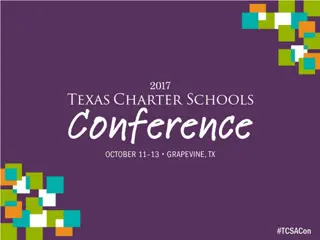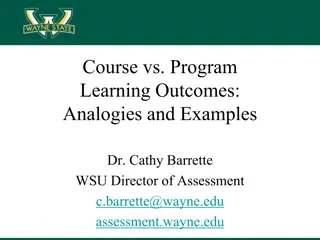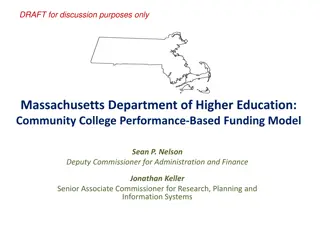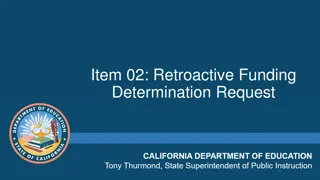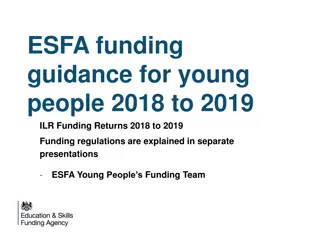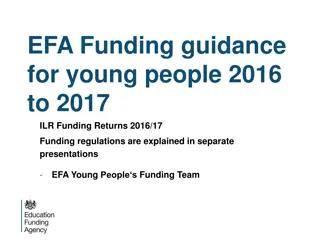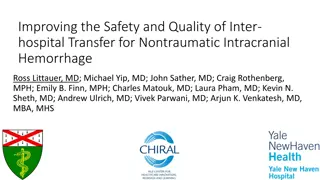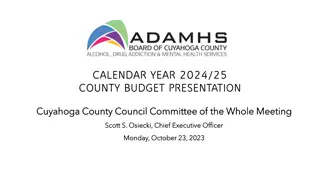
Mississippi Community Colleges Outcomes-Based Funding Committee Report
Explore the purpose and timeline of the committee tasked with developing an outcomes-based funding formula for Mississippi's community colleges. Learn about the committee members, their roles, and the strategic planning process to enhance educational outcomes.
Download Presentation

Please find below an Image/Link to download the presentation.
The content on the website is provided AS IS for your information and personal use only. It may not be sold, licensed, or shared on other websites without obtaining consent from the author. If you encounter any issues during the download, it is possible that the publisher has removed the file from their server.
You are allowed to download the files provided on this website for personal or commercial use, subject to the condition that they are used lawfully. All files are the property of their respective owners.
The content on the website is provided AS IS for your information and personal use only. It may not be sold, licensed, or shared on other websites without obtaining consent from the author.
E N D
Presentation Transcript
Mississippis Community & Junior Colleges A REPORT FROM THE OUTCOMES-BASED (PERFORMANCE) FUNDING COMMITTEE
PURPOSE OF THE COMMITTEE To study and make recommendations to the MACJC (the Presidents Association) and ultimately to the MCCB with regard to the creation and implementation of an outcomes-based funding formula to be used to disburse funds to the fifteen community colleges. This is in direct response to requests by members of both the Senate and House Appropriations Committee. This work will also be used to inform the Education Achievement Council, which was charged in 2011 (HB 875) with developing a funding mechanism for community and junior colleges and universities based on productivity, in addition to enrollment.
COMMITTEE MEMBERSHIP Dr. Billy Stewart, President - East Central Community College & MACJC Accountability Point Person, CHAIR Dr. William Lewis, President - Pearl River Community College Dr. Larry Nabors, President - MS Delta Community College Dr. Gary Spears, President - Northwest MS Community College Dr. Fran Cox, Holmes Community College, Past-Chair - Academic Officers Association Mr. Napoleon Jones, East MS Community College, Chair - Chief Career Tech Officers Association Mr. Chris Murphy, Northeast MS Community College, Chair - Chief Financial Officers Association Ms. Cathy Parker, Meridian Community College, Chair - Chief Institutional Research Officers Association Mr. Raul Fletes, Asst. Executive Director for Research & Effectiveness MCCB Ms. Deborah Gilbert, Deputy Executive Director for Finance & Administration MCCB Dr. Debra West, Deputy Executive Director for Programs & Accountability MCCB EX-OFFICIO (non-voting): Dr. Eric Clark, Executive Director, MCCB Dr. Johnny Allen, President Northeast MS Community College, MACJC Chair Dr. Clyde Muse, President Hinds Community College, MACJC Legislative Chair This effort will be facilitated by Dr. Jimmy Clark and Ms. Martha Snyder, of HCM Strategists. HCM Strategists has worked with numerous state systems across the U.S. in developing outcomes-based funding models.
TIME LINE April 2, 2PM Capitol April 2, 2PM Capitol Meeting with Senator Burton, Meeting with Senator Burton, Representative Baker Representative Baker Introduction of Jimmy Clarke; Introduction of Jimmy Clarke; overview of process overview of process Discuss purpose and process; Adoption of Guiding Principles; Review all existing metrics and benchmarks; discussion of weighting Determination of potential metrics and weights; Finalization of potential metrics and weights; Discussion of Potential Data Runs Review of Data Runs; Discussion of Recommendations Draft Recommendations to MACJC for discussion Formula presented to MACJC for Final Approval Formula presented to MCCB for Final Approval Colleges and MCCB will need to adjust their strategic plans accordingly. Proposed Formula to Appropriations Chairs, PEER, LBO April 8 (Jackson) 1 1st stGroup Meeting Group Meeting - - 10AM 2PM 2PM 10AM- - April 28 (Jackson) 2 2nd ndGroup Meeting Group Meeting - - 10AM 3 3nd Group - - 10AM 10AM- -2PM 10AM- -2PM 2PM 2PM ndGroup May 21 4 4th thGroup Meeting 10AM Group Meeting 10AM- -2PM) 2PM) June 8th MACJC Legislative Workshop MACJC Legislative Workshop June 14-17 (Tupelo) MACJC Special Called Meeting MACJC Special Called Meeting July 21 (Tentative) MCCB Meeting MCCB Meeting August 21 (Jackson) Month of August Incorporation into Strategic Incorporation into Strategic Plans to be submitted to LBO Plans to be submitted to LBO Presentation to Legislature Presentation to Legislature Sept. 1
GUIDING PRINCIPLES The funding formula will be linked to statewide educational goals and will be aligned to state and system priorities as articulated in Building a Better Mississippi The Statewide Strategic Plan for Performance and Budgetary Success and the Statewide Strategic Plan Benchmarks for Community Colleges. The funding formula will support the mission of Mississippi s community colleges to provide a quality educational experience that promotes student access, student completion, and student success. The funding formula will provide opportunity for all community colleges to succeed by recognizing the priorities and unique needs of the institutions, including the success of underserved student populations and the development of the local workforce. The funding formula will be reasonably simple to understand and communicate, using a limited number of metrics. The funding formula will be sustainable and consistent, including applicable metrics grounded in existing data which are reliable, valid, and verifiable.
STATE LEVEL ACCOUNTABILITY METRICS Statewide Statewide Strategic Strategic Benchmarks Benchmarks (2014) (2014) Annual Report Annual Report Cards (2010) Cards (2010) Targeted Targeted Performance Performance Measures in Measures in Appropriations Appropriations Bill (1994) Bill (1994) Performance (Outcomes Based) Funding
METRICS Student Progression/Retention Student Progression/Retention Number of students who earned cumulative credit hours towards a degree (i.e., non-developmental) at the 15, 30, 45 credit hour thresholds. (Includes transfer hours towards degree.) Student Completion Student Completion The total number of university parallel (AA, AS) degrees awarded (three- year rolling average). The number of ALL degrees (AA, AS, AAS) and certificates (CC, TC) awarded per 100 FTEs (a three-year rolling average). Workforce Education Workforce Education The total number of career certificates awarded (three-year rolling average). The total number of technical certificates awarded (three-year rolling average). The total number of AAS degrees awarded (three-year rolling average).
FORMULA PRIORITY WEIGHTS Progression (25%) 15 cumulative degree hrs (6.25%) 30 cumulative degree hrs (6.25%) 45 cumulative degree hrs (12.50%) Completion (50%) University parallel degrees (25%) Total degrees/100 FTE (25%)
FORMULA PRIORITY WEIGHTS Workforce Education (25%) Career Certificate (6.25%) Technical Certificate (6.25%) AAS degree (12.50%)
STUDENT ACCESS (ADDED WEIGHTS) Pell Eligibility (0.5) Academically Underprepared, based upon placement score (0.5) Adult Learners, age 25 and older (0.25) Dual Credit/Dual Enrollment (0.25) These students get additional points in the formula. Students may count in more than one category. Once a student hits a category, the weight carries forward, regardless of whether the student s status changes.
HOW WILL OUTCOMES FACTOR INTO FUNDING? The recommendation from the Committee is to allocate 5% of the total formula after the 15% base is taken out. A recommendation will be made, but ultimately the legislature will have to approve.
WHAT DOES THIS MEAN FOR YOU???? Data quality is more important that ever. Additional fields added to primary enrollment file. Placement scores Pell Cumulative credit hrs towards degree Outcomes will be audited, as well as admission and attendance.
QUESTIONS?? Cathy Parker Director of Institutional Effectiveness & Accountability Meridian Community College cparker@mcc.cc.ms.us Debra West, Ph.D. Deputy Exec. Director, Programs & Accountability MS Community College Board dwest@mccb.edu








